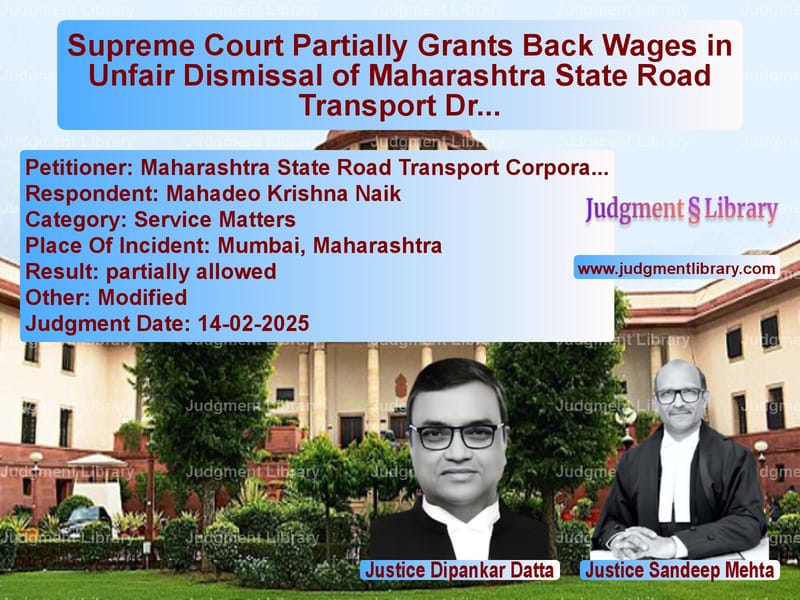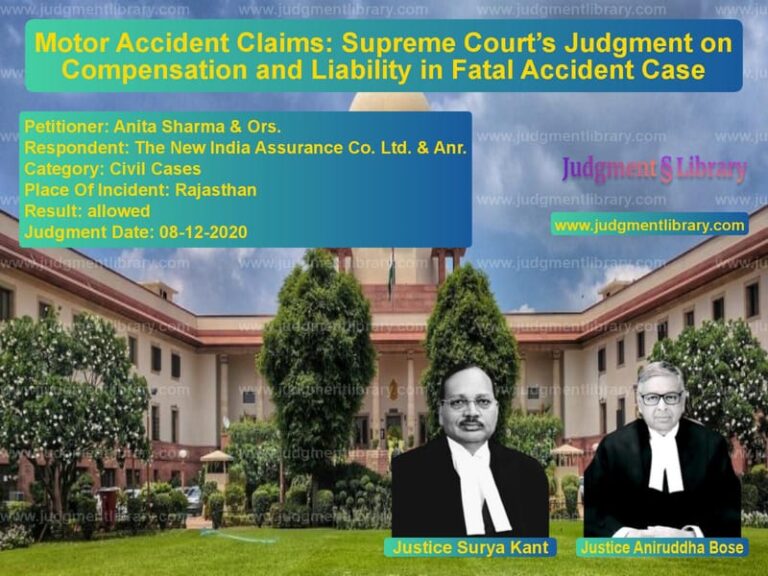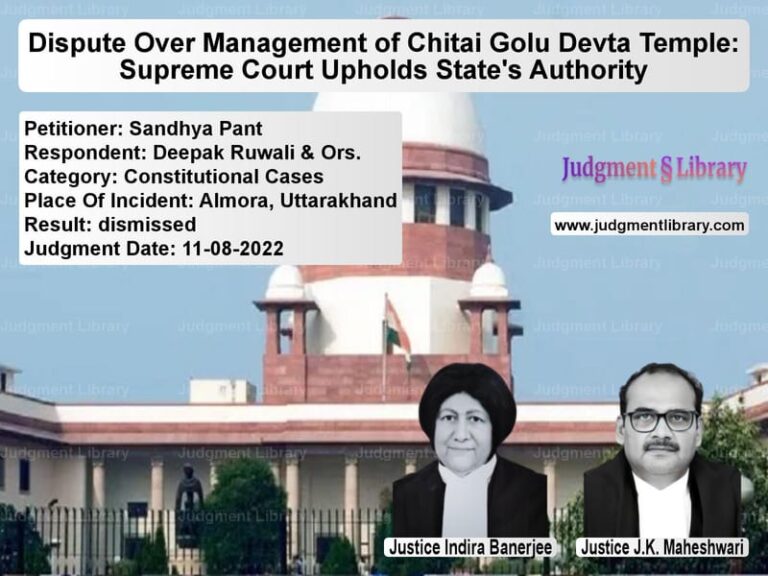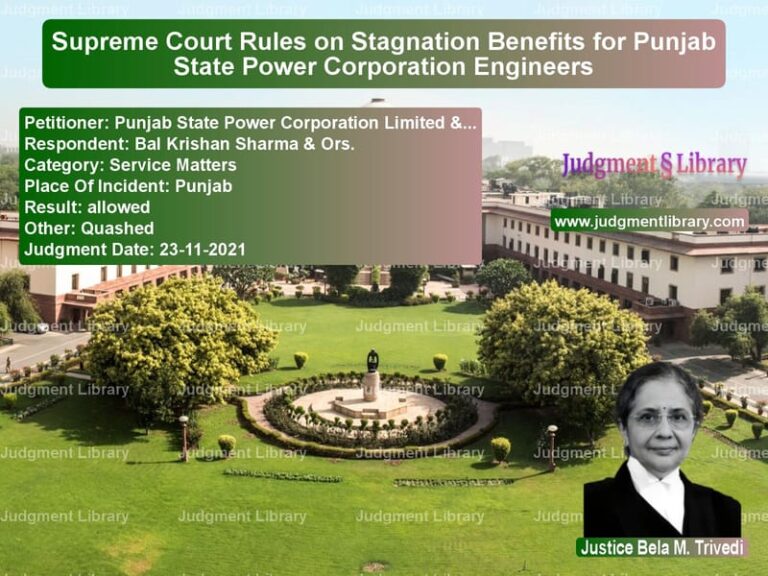Supreme Court Partially Grants Back Wages in Unfair Dismissal of Maharashtra State Road Transport Driver
The Supreme Court of India, in the case of Maharashtra State Road Transport Corporation v. Mahadeo Krishna Naik, ruled in favor of the reinstatement of a dismissed bus driver and granted him 75% back wages instead of full back wages. The case revolved around conflicting positions taken by the employer in different legal forums, ultimately leading the Court to hold that the driver had been wrongfully dismissed.
Background of the Case
The dispute arose when the respondent, Mahadeo Krishna Naik, a bus driver with the Maharashtra State Road Transport Corporation (MSRTC), was dismissed from service following a fatal accident that occurred on May 10, 1996. The accident involved a collision between an MSRTC bus driven by Mahadeo and a lorry, resulting in two passenger deaths and injuries to several others. The MSRTC blamed Mahadeo for negligence and terminated his employment on May 27, 1997.
Legal Proceedings
Disciplinary Proceedings and Labour Court Verdict
Following his dismissal, Mahadeo challenged the decision before the Labour Court. The Labour Court upheld the dismissal, ruling that the inquiry was fair and the findings were not perverse. The punishment was deemed proportionate to the alleged misconduct.
First Writ Petition and High Court Review
Mahadeo then filed a writ petition before the Bombay High Court under Article 226 of the Indian Constitution. The single judge initially dismissed his petition in 2017, citing the Labour Court’s findings.
However, in 2018, Mahadeo filed a review petition after discovering that the MSRTC had taken a completely opposite stance in proceedings before the Motor Accident Claims Tribunal (MACT). In its defense before the MACT, the MSRTC had argued that the accident was entirely the fault of the lorry driver and not Mahadeo.
Contradiction in Employer’s Stance
The MSRTC, while defending itself in compensation claims filed by the victims’ families before the MACT, asserted that:
- The accident was caused solely due to the negligence of the lorry driver.
- Mahadeo had no role in causing the accident.
- The MACT, in its final award, accepted the MSRTC’s position and held the lorry driver responsible, absolving the MSRTC from liability.
This directly contradicted the position taken by MSRTC before the Labour Court, where it argued that Mahadeo was responsible for negligence.
Supreme Court’s Observations and Judgment
The Supreme Court, while hearing MSRTC’s appeal against the Bombay High Court’s review decision, noted that the employer had engaged in misleading conduct by presenting inconsistent positions in different legal proceedings.
Key Observations by the Court:
- “The Corporation indulged in suggestio falsi and suppressio veri by concealing material facts before the Labour Court.”
- “The MSRTC, while trying to avoid paying compensation to victims, argued that Mahadeo was not at fault, but took the opposite stand to justify his dismissal.”
- “This amounts to a fraud on the court and is a violation of the principles of fairness and natural justice.”
- “When the employer’s own evidence before the MACT exonerates the employee, the termination order cannot be sustained.”
Final Ruling
The Supreme Court ruled:
- The termination of Mahadeo Krishna Naik was wrongful.
- Since Mahadeo had already reached the age of superannuation, he was not to be reinstated.
- Instead of full back wages, Mahadeo was granted 75% of back wages from the date of termination until superannuation.
- MSRTC was directed to pay all terminal benefits with 6% interest per annum.
- Any delay in payment beyond three months would result in an additional 2% penalty interest.
Impact of the Judgment
This ruling has significant implications for employment law and labor disputes:
- Accountability for Employers: Government corporations cannot take contradictory positions in different legal forums to suit their convenience.
- Fairness in Disciplinary Proceedings: The judgment reinforces the need for fair trials in labor disputes and ensures that procedural fairness is upheld.
- Precedent for Back Wages: While back wages are not automatic, they can be granted when wrongful termination is proven, depending on case-specific factors.
Conclusion
The Supreme Court’s decision in Maharashtra State Road Transport Corporation v. Mahadeo Krishna Naik is a landmark ruling that strengthens protections against wrongful termination. It ensures that employers cannot manipulate the legal system by presenting contradictory narratives and reinforces the principles of fairness in labor law.
Petitioner Name: Maharashtra State Road Transport Corporation.Respondent Name: Mahadeo Krishna Naik.Judgment By: Justice Dipankar Datta, Justice Sandeep Mehta.Place Of Incident: Mumbai, Maharashtra.Judgment Date: 14-02-2025.
Don’t miss out on the full details! Download the complete judgment in PDF format below and gain valuable insights instantly!
Download Judgment: maharashtra-state-ro-vs-mahadeo-krishna-naik-supreme-court-of-india-judgment-dated-14-02-2025.pdf
Directly Download Judgment: Directly download this Judgment
See all petitions in Employment Disputes
See all petitions in Disciplinary Proceedings
See all petitions in Judgment by Dipankar Datta
See all petitions in Judgment by Sandeep Mehta
See all petitions in partially allowed
See all petitions in Modified
See all petitions in supreme court of India judgments February 2025
See all petitions in 2025 judgments
See all posts in Service Matters Category
See all allowed petitions in Service Matters Category
See all Dismissed petitions in Service Matters Category
See all partially allowed petitions in Service Matters Category







